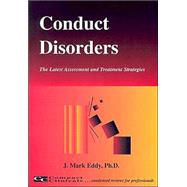
| Overview of the Conduct Disorders | p. 1 |
| What Are the Conduct Disorders? | p. 2 |
| How Common are the Conduct Disorders? | p. 3 |
| What is the Prognosis for those with a Conduct Disorder? | p. 4 |
| Diagnosing the Conduct Disorders | p. 7 |
| What Criteria are Used to Diagnose the Conduct Disorders? | p. 7 |
| Diagnostic Clarifying Information | p. 11 |
| Clinical Significance | p. 11 |
| Specific Criteria | p. 11 |
| Early and Late Subtypes | p. 11 |
| How Can Clinicians Develop an Effective Assessment Strategy? | p. 12 |
| Handling the Initial Call | p. 14 |
| Collecting Behavioral Rating Scales | p. 15 |
| CBC-L | p. 15 |
| DBD | p. 16 |
| Conducting Intake Interviews | p. 16 |
| Parent Interviews | p. 16 |
| Child Interviews | p. 18 |
| Teacher Interviews | p. 18 |
| Using Other Assessment Methods | p. 19 |
| Standardized Clinical Interviews | p. 19 |
| Common Psychometric Instruments | p. 19 |
| Parent Daily Report (PDR) Telephone Interviews | p. 20 |
| Observations | p. 20 |
| Historical Records | p. 22 |
| Presenting Assessment Results | p. 23 |
| What Other Disorders Commonly Occur with Conduct Disorders? | p. 24 |
| Attention Deficit Hyperactivity Disorder | p. 25 |
| Major Depressive Disorder/Dysthymia/Anxiety Disorders | p. 26 |
| Bipolar I Disorder | p. 26 |
| Substance Abuse/Dependence | p. 26 |
| Differential Diagnosis | p. 27 |
| Psychological Treatments for the Conduct Disorders | p. 29 |
| What is the Behavior Therapy Approach to Treating CD? | p. 30 |
| Parent Training | p. 31 |
| Assessment Phase | p. 33 |
| Treatment Phase | p. 35 |
| Follow-up After Program Termination | p. 40 |
| Effectiveness of Parent Training Programs | p. 40 |
| School-Based Programs (Class and Recess) | p. 41 |
| Class Treatment Process | p. 41 |
| Recess Treatment Process | p. 42 |
| Follow-up After Program Termination | p. 43 |
| Effectiveness of School-Based Programs | p. 43 |
| Multidimensional Treatment Foster Care | p. 43 |
| Treatment Process | p. 44 |
| Follow-up After Termination | p. 45 |
| Effectiveness of Multidimensional Treatment Foster Care | p. 45 |
| What is the Cognitive Therapy Approach to Treating CD? | p. 46 |
| Treatment Process | p. 47 |
| Follow-up after Program Termination | p. 49 |
| Effectiveness of the Cognitive Approach | p. 49 |
| What is the Family Therapy Approach to Treating CD? | p. 49 |
| Functional Family Therapy | p. 50 |
| Treatment Process | p. 51 |
| Follow-up After Program Termination | p. 51 |
| Effectiveness of Functional Family Therapy | p. 51 |
| Multisystemic Treatment | p. 52 |
| Treatment Process | p. 52 |
| Follow-up After Program Termination | p. 53 |
| Effectiveness of MST | p. 53 |
| How is Group Therapy Used to Treat CD? | p. 54 |
| Community Center-Based Group Treatment | p. 54 |
| Treatment Process | p. 55 |
| Follow-up After Program Termination | p. 55 |
| Effectiveness of Community Center Group Therapy | p. 55 |
| Day Camp Group Treatment | p. 56 |
| Treatment Process | p. 56 |
| Follow-up After Program Termination | p. 57 |
| Effectiveness of STP | p. 57 |
| How is the Psychodynamic Approach Used to Treat CD? | p. 58 |
| Assessment Phase | p. 59 |
| Treatment Process | p. 59 |
| Follow-up After Program Termination | p. 60 |
| Effectiveness of the Psychodynamic Approach | p. 60 |
| Biological Influences and Treatments for the Conduct Disorders | p. 63 |
| Is there a Genetic Component to the Conduct Disorders? | p. 64 |
| How are Medications Used to Treat the Conduct Disorders? | p. 65 |
| Antipsychotics | p. 65 |
| Stimulants | p. 66 |
| Mood Stabilizers | p. 67 |
| Divalproex Sodium (Valproate) | p. 67 |
| Lithium | p. 68 |
| Other Medications | p. 68 |
| Antidepressants (Fluoxetine, Bupropion) | p. 68 |
| Noradrenergics (Clonidihe) | p. 69 |
| What is the Effectiveness of Medication Therapy? | p. 71 |
| Appendix: References for the Clinician's Bookshelf | p. 73 |
| Glossary | p. 79 |
| References | p. 83 |
| Index | p. 95 |
| Table of Contents provided by Ingram. All Rights Reserved. |
The New copy of this book will include any supplemental materials advertised. Please check the title of the book to determine if it should include any access cards, study guides, lab manuals, CDs, etc.
The Used, Rental and eBook copies of this book are not guaranteed to include any supplemental materials. Typically, only the book itself is included. This is true even if the title states it includes any access cards, study guides, lab manuals, CDs, etc.